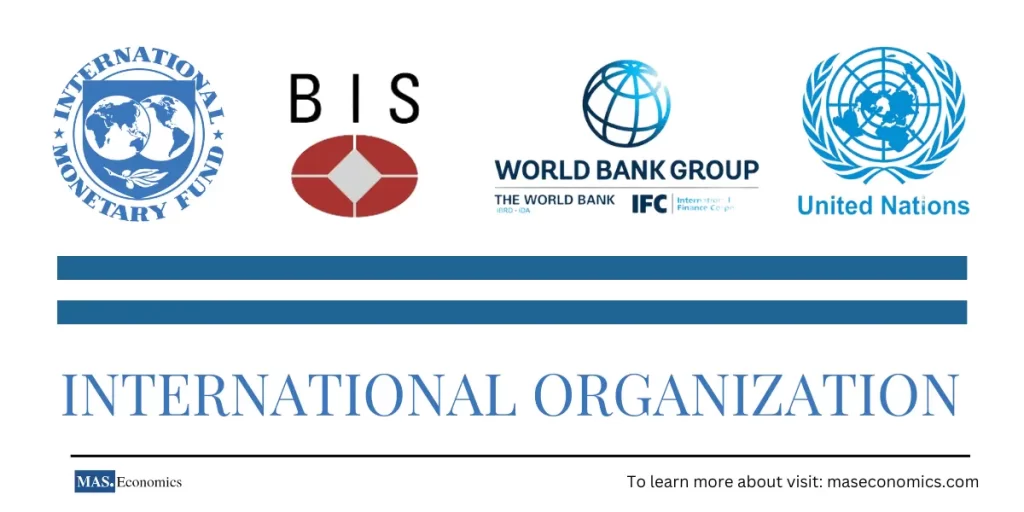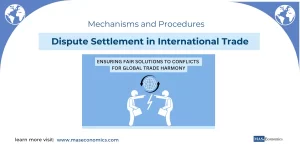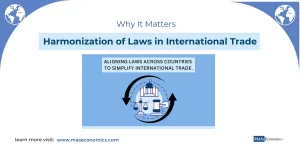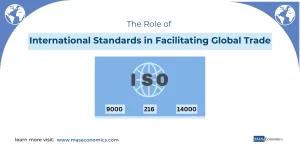The role of international organizations in the global economy has become increasingly vital in today’s interconnected world. As markets and economies rapidly globalize, these institutions act as key intermediaries between nations, facilitating the smooth cross-border flow of capital, goods, services, and people. Their operations can help prevent economic crises, support development, and foster international cooperation. Understanding their operations is crucial for anyone interested in business, economics, or global policy, as they have a direct impact on trade, investment, and policymaking.
International organizations promote economic stability by providing platforms for dialogue and cooperation, overseeing global financial systems, addressing systemic risks, and advising on policy reforms. They are indispensable for fostering international collaboration and ensuring the resilience of the economic order.
Let’s explore the roles and contributions of some of these major organizations.
International Monetary Fund (IMF)
The International Monetary Fund (IMF) is responsible for ensuring the stability of the international monetary system and assisting countries facing balance of payment challenges. Founded in 1944 at the Bretton Woods Conference, the IMF has 190 member countries. Its headquarters are in Washington, D.C.
The IMF acts as a lender of last resort, offering financial assistance to countries during economic crises and providing technical guidance on macroeconomic policies, good governance, and economic reforms. For example, during the 1997 Asian financial crisis, the IMF provided emergency loans to countries like Thailand, Indonesia, and South Korea, which helped stabilize their economies and restore investor confidence. Member countries contribute funds to a pooled reserve through a quota system, which can be drawn upon in times of need. This helps maintain liquidity and economic stability across member nations. For example, during the 2008 financial crisis, the IMF provided critical loans to countries like Greece, Ireland, and Portugal to stabilize their economies.
Beyond financial assistance, the IMF actively monitors global economic trends and publishes research that provides insights into current developments, helping member states craft effective policies in the global context. This monitoring is critical, as it helps preempt economic crises by identifying potential risks early on.
The IMF also provides technical assistance and training to member countries, which includes helping governments develop effective tax systems, build sound monetary policies, and strengthen public financial institutions. For instance, in Ghana, the IMF’s technical assistance was instrumental in improving the country’s revenue collection system, leading to a more stable fiscal environment.
Executive Board and Structure
The IMF is governed by an Executive Board led by a Managing Director, who chairs the 24-member board representing all member countries. Countries with large economies are represented individually, while others are grouped into constituencies. The power each country wields is determined by its quota in the IMF, which influences voting rights, access to funding, and allocation of Special Drawing Rights (SDRs).
The International Monetary and Finance Committee (IMFC), a body of 24 members mirroring the Executive Board, provides strategic guidance and fosters dialogue among members. While the IMFC has no formal voting authority, its recommendations influence IMF policies significantly.
World Bank (WB)
The World Bank was founded during the Bretton Woods Conference in 1944, originally to aid post-WWII reconstruction. Today, its focus is on long-term development, with an emphasis on infrastructure, education, healthcare, and poverty reduction. Its headquarters are also located in Washington, D.C.
The World Bank has set two ambitious goals: ending extreme poverty by reducing the global poverty rate to 3% by 2030 and promoting shared prosperity by boosting incomes among the poorest 40% of every country. To achieve these goals, the World Bank is involved in projects like expanding renewable energy in Africa, improving education access in South Asia, and building infrastructure to support sustainable urbanization in Latin America.
World Bank Group (WBG)
The World Bank Group (WBG) comprises five institutions:
- International Bank for Reconstruction and Development (IBRD): Provides long-term loans and policy advice to middle-income and creditworthy low-income countries. The IBRD also helps countries tackle development challenges through financial products, technical expertise, and partnerships.
- International Development Association (IDA): Focuses on supporting the world’s poorest countries, providing low-interest loans and grants. The IDA has been instrumental in addressing issues like climate change, food insecurity, and education in developing nations.
- International Finance Corporation (IFC): Offers investment, advisory, and asset-management services to encourage private sector development in developing countries. By supporting private enterprises, the IFC helps create jobs, improve living standards, and drive economic growth.
- Multilateral Investment Guarantee Agency (MIGA): Provides political risk insurance and credit enhancement to encourage investment. MIGA’s services help mitigate risks related to political instability, currency inconvertibility, and other non-commercial risks that could deter investment.
- International Centre for Settlement of Investment Disputes (ICSID): Facilitates dispute resolution between international investors and states, providing a neutral platform to settle conflicts that arise from investment agreements. ICSID has become a vital tool in maintaining investor confidence and ensuring that developing countries can attract foreign investments.
Together, these institutions work to reduce poverty, support infrastructure, and encourage sustainable economic development. The World Bank Group’s activities extend beyond financing; they include advisory services, capacity building, and research to support policy reforms in developing countries. These multi-pronged efforts ensure that development goals are met sustainably.
Governance Structure
The World Bank is a cooperative of 189 countries, each represented by a Board of Governors composed of their respective finance or development ministers. The Board meets annually to discuss policies and review operations, while day-to-day operations are overseen by an executive board.
The voting power of each member country depends on the number of shares it holds in the organization. Typically, these shares are determined by the country’s economic strength. Thus, countries with larger economies have more influence on the decision-making processes.
United Nations (UN)
The United Nations (UN) was established in 1945 to promote international peace, security, and cooperation. Its headquarters are in New York City, with offices worldwide. The UN consists of six principal organs:
- General Assembly: A deliberative body representing all member states with equal voting power. It serves as the main forum for discussion, deliberation, and policymaking on global issues.
- Security Council: Responsible for maintaining peace and security, with five permanent members (China, France, Russia, the United Kingdom, and the United States) and ten non-permanent members. It has the authority to impose sanctions or authorize military action.
- Economic and Social Council (ECOSOC): Coordinates economic, social, and environmental initiatives, providing policy recommendations and fostering international collaboration on key issues, including poverty, health, and education.
- International Court of Justice (ICJ): Settles legal disputes between countries in accordance with international law. The ICJ also provides advisory opinions on legal questions referred by authorized international bodies.
- Secretariat: Carries out the day-to-day operations of the UN, led by the Secretary-General. The Secretariat’s role includes administering peacekeeping missions, mediating international disputes, and implementing the policies set by other UN bodies.
- Trusteeship Council: Although inactive since 1994, it was responsible for overseeing territories transitioning to self-governance.
The UN also collaborates with specialized agencies such as the World Health Organization (WHO), International Labour Organization (ILO), and United Nations Educational, Scientific and Cultural Organization (UNESCO), to address global challenges like health crises, labor rights, and education. The Sustainable Development Goals (SDGs), adopted in 2015, serve as a framework for the UN’s efforts to end poverty, protect the planet, and ensure prosperity for all.
World Trade Organization (WTO)
The World Trade Organization (WTO), established in 1995, oversees the global rules of trade between nations, aiming to ensure that trade flows smoothly, predictably, and freely. With 164 member nations, its headquarters are in Geneva, Switzerland.
The WTO provides a framework for negotiating trade agreements and settling disputes, promoting fair and open trade. Its role is critical in fostering economic growth and ensuring that smaller economies are not marginalized in the global trading system. The WTO’s dispute resolution mechanism is a cornerstone of its operations, helping to resolve trade conflicts and maintain stability in international commerce.
The WTO also plays a role in monitoring trade policies, providing a platform for member states to evaluate each other’s practices and ensure adherence to agreed rules. This promotes transparency and accountability, which are essential for a fair trading environment. The WTO has faced criticism for its perceived bias toward developed nations, as developing countries often struggle to meet the stringent standards needed to compete effectively.
Bank for International Settlements (BIS)
The Bank for International Settlements (BIS), founded in 1930, acts as a bank for central banks, with its headquarters in Basel, Switzerland. It fosters international monetary and financial cooperation among its 63 member central banks, representing nearly all of the global economy.
The BIS also serves as a research hub, analyzing critical topics such as monetary policy, financial stability, and banking regulation. It plays a pivotal role in helping central banks address challenges like climate change and other global disruptions.
Through its regular meetings, the BIS provides a forum where central bank officials can discuss policy issues, exchange views on global economic trends, and develop a shared understanding of the challenges facing the global economy. This role is crucial for ensuring that monetary policies across countries are harmonized, which is key to maintaining global economic stability. Recently, BIS has also focused on digital currencies, providing central banks with guidance on adopting and regulating these emerging forms of money.
Financial Action Task Force (FATF)
The Financial Action Task Force (FATF), established in 1989, sets global standards to combat money laundering, terrorist financing, and other financial crimes. Based in Paris, France, the FATF works closely with governments and private sectors to implement effective anti-money laundering measures.
Through its Recommendations known as the “Forty Plus Nine,” the FATF ensures that member countries adopt robust legal and regulatory frameworks to counter financial crimes. It also regularly assesses countries to ensure compliance, placing those that fall short on a gray or blacklist, which impacts their ability to interact financially with other countries.
The FATF plays a significant role in safeguarding the integrity of the international financial system by promoting transparency and information-sharing among member countries. This helps detect and prevent illegal activities, ensuring the stability of financial markets. For example, the FATF’s efforts were instrumental in helping countries strengthen measures to counter terrorist financing after the 9/11 attacks.
G20
The G20 is an international forum of the world’s major economies, established in 1999. It includes 19 countries and the European Union, representing a mix of advanced and emerging economies. The G20 meets annually to discuss policies for achieving global economic stability, sustainable growth, and resilience.
Unlike other organizations, the G20 does not have a permanent secretariat or staff. It operates through a rotating presidency, which hosts and sets the agenda for annual summits. The G20’s broad representation makes it an influential body for international economic policymaking, as it brings together the perspectives of both developed and developing countries.
The G20 summits often tackle a wide range of issues, including financial regulation, climate change, digitalization, and global health. The forum provides an opportunity for the world’s leading economies to coordinate their policies, particularly in times of global financial crises, such as the 2008 financial collapse and the recent COVID-19 pandemic. For instance, during the COVID-19 crisis, the G20 coordinated efforts to provide financial support to developing countries and ensure the availability of vaccines.
North Atlantic Treaty Organization (NATO)
NATO, a political and military alliance formed in 1949, aims to ensure the security of its 28 member countries through collective defense. It was initially created to counterbalance the influence of the Soviet Union during the Cold War but has evolved to respond to modern threats, including cyber warfare and terrorism.
NATO’s mission includes peacekeeping, crisis management, and fostering regional stability. Although its primary focus is defense, NATO has also expanded its role in areas like disaster response and humanitarian aid, thereby contributing to global security.
NATO operates through a series of joint military exercises and collaboration between member states, which enhances the collective defense capabilities of the alliance. Furthermore, NATO’s partnerships with non-member countries extend its influence and support peace and stability initiatives worldwide. For example, NATO has played a significant role in peacekeeping operations in the Balkans and Afghanistan, contributing to both regional and global stability.
Challenges and Criticisms
Despite their significant roles, international organizations often face criticism and challenges. For instance, during the COVID-19 pandemic, the IMF faced criticism for the stringent conditions attached to its emergency loans, which some argued hindered recovery efforts by imposing austerity measures at a time when countries needed to increase public spending to address the health crisis. The IMF is sometimes criticized for imposing stringent austerity measures that may stifle economic growth in the countries it assists. These austerity programs often require governments to cut public spending, leading to reductions in healthcare, education, and other social services, which can increase inequality.
Similarly, the World Bank has faced backlash for financing projects that have environmental or social consequences, such as displacing local communities or contributing to environmental degradation. The World Trade Organization (WTO) is often accused of favoring developed nations over developing ones, as many poorer countries struggle to meet the regulatory standards required to benefit fully from international trade.
The COVID-19 pandemic highlighted the inability of some international organizations to respond quickly and effectively to a global crisis. Limited resources, bureaucracy, and the challenge of coordinating multiple member states sometimes slowed down decision-making processes, impacting their effectiveness in mitigating the crisis’s economic and social impacts.
Another challenge is the need to balance national sovereignty with global governance. Member countries may resist policy recommendations from international bodies that appear to infringe upon their autonomy. This tension is evident in organizations like the IMF and WTO, where countries sometimes feel pressured to implement policies that may not align with their domestic priorities.
Conclusion
International organizations are the backbone of the global economic order, facilitating cooperation, ensuring stability, and guiding policy reform. Despite their challenges, these entities play essential roles in responding to global issues, fostering economic growth, and stabilizing financial markets.
Going forward, these organizations must continue to evolve to meet the changing needs of the global community. Their ability to promote collaboration, adapt to new economic realities, and address pressing issues such as digital finance, climate-related economic risks, and geopolitical shifts will be pivotal in building a resilient global economy. The unwavering commitment of international organizations to financial stability, poverty reduction, and sustainable development will help secure a more prosperous and equitable future for all.
FAQs:
What is the primary role of international organizations in the global economy?
International organizations act as intermediaries that facilitate economic cooperation, monitor global economic trends, provide policy guidance, and help maintain stability by supporting cross-border trade, investment, and crisis management.
How does the IMF support countries during economic crises?
The IMF provides financial assistance to countries facing balance of payment issues, serving as a lender of last resort. It offers loans and technical guidance to stabilize economies, as seen during crises like the 1997 Asian financial crisis and the 2008 global financial crisis.
What are the main goals of the World Bank?
The World Bank aims to end extreme poverty by reducing the global poverty rate and promoting shared prosperity by increasing incomes among the poorest 40% in every country. It funds projects related to infrastructure, education, healthcare, and sustainable development.
How does the WTO promote fair trade?
The WTO provides a framework for negotiating trade agreements, monitors trade policies, and offers a dispute resolution mechanism. Its aim is to create a level playing field, ensuring that trade flows smoothly, predictably, and freely among member countries.
What role does the BIS play in the global economy?
The BIS, or Bank for International Settlements, acts as a bank for central banks, promoting monetary and financial stability through research, policy discussions, and coordination among its 63 member central banks.
How does the G20 influence global economic policy?
The G20, a forum of major global economies, coordinates international policies on economic stability, sustainable growth, and crisis management. Through its annual summits, the G20 addresses issues like financial regulation, climate change, and global health challenges.
What is the FATF’s purpose in the international financial system?
The FATF (Financial Action Task Force) sets global standards to combat money laundering, terrorist financing, and other financial crimes. It promotes transparency in financial systems and ensures member countries implement effective anti-money laundering measures.
How do international organizations address challenges like environmental impact and social issues?
Organizations like the World Bank integrate social and environmental standards into their projects to mitigate negative impacts. However, criticisms persist, as some projects have led to displacement and environmental concerns, highlighting the need for careful project evaluation and implementation.
Thanks for reading! Share this with friends and spread the knowledge if you found it helpful.
Happy learning with MASEconomics




